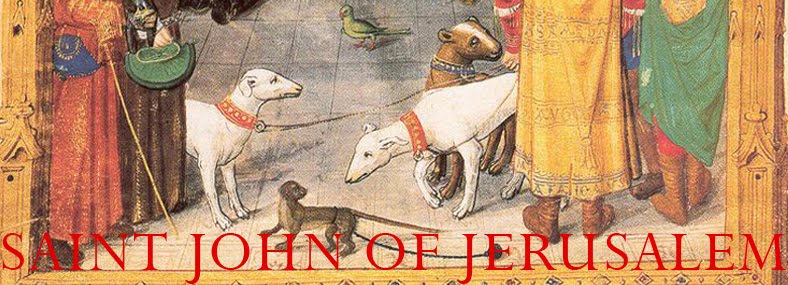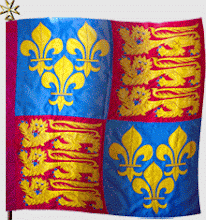 Deus in te sperántium fortitudo, adesto precibus nostris : quas tibi cum gratiarum offerimus actione : pro Victoria Magistro nostro, ac ejus exercitui, contra hostes Fidei Christianæ Turcos, per te mirabiliter Rhodi concessa : supliciter deprecantes: ut solitá tuæ pietatis clementiá muniti, dextráque tuæ potentiæ defensi : ab hostium insidiis, omníque adversitate protegámur. Per Dominum nostrum Jesum Filium tuum. Qui tecum vivit et regnat in unitate Spiritus Sancti Deus, per omnia sæcula sæculorum.
Deus in te sperántium fortitudo, adesto precibus nostris : quas tibi cum gratiarum offerimus actione : pro Victoria Magistro nostro, ac ejus exercitui, contra hostes Fidei Christianæ Turcos, per te mirabiliter Rhodi concessa : supliciter deprecantes: ut solitá tuæ pietatis clementiá muniti, dextráque tuæ potentiæ defensi : ab hostium insidiis, omníque adversitate protegámur. Per Dominum nostrum Jesum Filium tuum. Qui tecum vivit et regnat in unitate Spiritus Sancti Deus, per omnia sæcula sæculorum.VICTORY OVER THE TURKS - RHODES 1480AD
 Deus in te sperántium fortitudo, adesto precibus nostris : quas tibi cum gratiarum offerimus actione : pro Victoria Magistro nostro, ac ejus exercitui, contra hostes Fidei Christianæ Turcos, per te mirabiliter Rhodi concessa : supliciter deprecantes: ut solitá tuæ pietatis clementiá muniti, dextráque tuæ potentiæ defensi : ab hostium insidiis, omníque adversitate protegámur. Per Dominum nostrum Jesum Filium tuum. Qui tecum vivit et regnat in unitate Spiritus Sancti Deus, per omnia sæcula sæculorum.
Deus in te sperántium fortitudo, adesto precibus nostris : quas tibi cum gratiarum offerimus actione : pro Victoria Magistro nostro, ac ejus exercitui, contra hostes Fidei Christianæ Turcos, per te mirabiliter Rhodi concessa : supliciter deprecantes: ut solitá tuæ pietatis clementiá muniti, dextráque tuæ potentiæ defensi : ab hostium insidiis, omníque adversitate protegámur. Per Dominum nostrum Jesum Filium tuum. Qui tecum vivit et regnat in unitate Spiritus Sancti Deus, per omnia sæcula sæculorum.BL. DAVID GUNSON PILGRIMAGE - SERMON
The Vocation of Martyrdom
What would you have done…? That’s the question that I always end up asking myself, whenever I read about this country in the 1530s. What would I have done…?
Of course, we’d all like to think that we’d have been among the three percent of this country’s population who remained faithful, so as to give up their lives for the Faith. But, if we were faced with losing everything (friends, family, house, income — even the Sacraments, and ultimately our lives), what would have stopped us being like all the other Catholics (all the other bishops, priests, religious, and pious faithful) who ended up abandoning the Church that they had presumably loved and cherished…?
Why was it that only three of the English Knights of Malta—at the time of the Order’s suppression in this country—were crowned with the glory of martyrdom…? Three times the number of bishops, it has to be said; and three times the number of government ministers: Saints John Fisher and Thomas More being the only representatives of their class… And the Order is rightly proud of this supreme witness to the faith, when so many—who should have known better, who should have been leading their lambs to the slaughter—preferred convenience and comfort. But what would we have done…?
It’s true to say that there were others who suffered a ‘white’ martyrdom: Knights of Malta who suffered exile; those who died in prison; and the heartbreaking account of the then Grand Prior, William Weston, who was spared the gallows, but collapsed and died, on hearing the news of his beloved Order’s suppression. But what of all those other knights? What of those knights and professed chaplains who were later to be found in England, collecting their royal pension, and even in personal service to King Henry VIII? What about Fra’ Edward Bellingham, now Gentleman of the Privy Chamber, or Fra’ Ambrose Cave, soon to be Chancellor of the Duchy of Lancaster?
Or, to be more blatant, what about Fra’ Philip Babington, the former Knight of Justice who brought the accusation against the blessed martyr that we celebrate today — against his confrère in the Grand Priory? What made a Babington a Babington, and a Gunson a Gunson…?
It’s not as if one of them got lucky — as if one of them managed the ‘shortcut’ to Heaven — as if, had circumstances been different, it could have been otherwise… Gunson arrived in England after the Order’s suppression — and, indeed, after the double martyrdom of Fortescue and Dingley. He knew what was coming.
Martyrs are not martyrs because of the ‘incidental blood’ that was shed. The cause of their martyrdom—the cause of their blessedness, their sanctity—is not their death, but their life: the life that leads them to martyrdom. Martyrdom is an expression of a relationship that already exists; it is a fulfilment of a love for Christ and for His Church. Of course, it is only grace that can bring us to love to such an extent as to offer our lives for that love — to prove that fullness of love which is martyrdom. But that grace is there for us all.
We may not all be called to a martyrdom of blood, but we are all called to be martyrs (to be witnesses) of truth — to make that truth known, through our sufferings, through our sacrifices, but—most of all—through our love: through being holy.
To be holy is to live out one’s vocation — to answer God’s call to our own personal holiness. The vocation of the Knight of Malta is summed up by its famous twin charism; it’s enunciated in that well-known Prayer of the Order that we’ll all recite at the end of our pilgrimage this evening, at the very place where our martyr lived out his vocation to the full: first, “to practise and defend the Catholic, the Apostolic, the Roman Faith against the enemies of religion” (tuitio fidei); and thereby “to practise charity towards my neighbours, especially the poor and the sick” (obsequium pauperum).
Like all vocations, it’s a vocation of love: it’s a fulfilment of Christ’s double commandment of love — love of God (tuitio fidei) and love of neighbour (obsequium pauperum). And, in the words of Christ’s vicar on earth—our current Holy Father—to be holy is “to love as Christ loves”. To be holy is not to know something, nor to do something, not even to be something — but it’s to be some-one: to be Christ.
At Saint Thomas Waterings, 482 years ago today, Blessed David Gunson (the ‘Good Knight’, as he became known) loved as Christ loves. He consummated his vocation; he carried out the real work of the Order — which, as the late Pope once put it, is “not mere philanthropy, but an effective expression and a living testimony of evangelical love”. That is a love that turns a life of ‘tuitio fidei’ into a death ‘in odium fidei’. It’s a love that turns ‘obsequium pauperum’ into an ‘obsequium mortis’, an ‘obsequium crucis’ — an ‘obedience unto death’, an ‘allegiance to the Cross’. It’s a love that tells us what to do, and how to ‘be Christ’.
Blessed David Gunson, pray for us.














